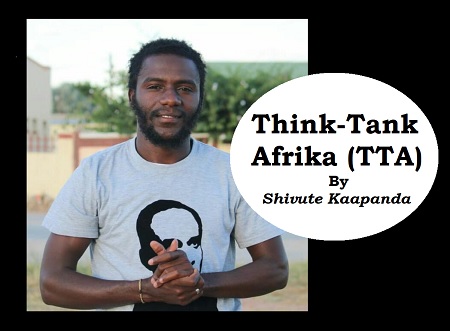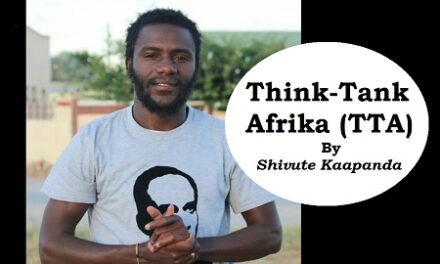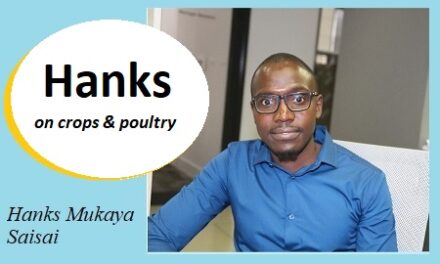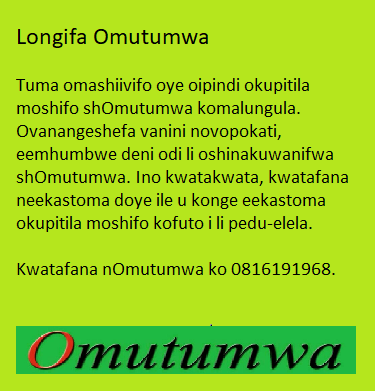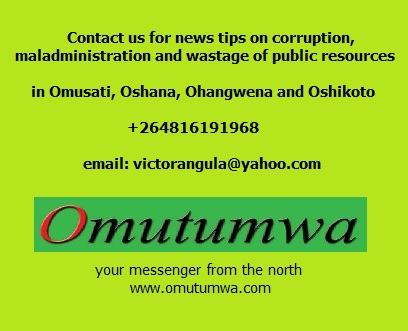The Poverty of Thinking: African Urban-life Orientation
By Shivute Kaapanda [Think Tank Africa]
In Africa, the manifestation of urban wellbeing is demonstrated in different ways of possession and succession which is often seen as urban culture of success mostly by majority Africans with ordinary and unexamined minds and lives.
With the concept of urban orientation being more dominant compared to rural residential system of land ownership due to its colonial backed-up economic value of land through acquisition of title deeds as compared to rural land ownership which has due to the colonial economic fabric been inherently reduced to temporary residence with no title deeds being owned by many rural dwellers across Namibia especially north of the 1896 colonial apartheid redline.
With the rapid rural-urban migration, urban areas have become inherently the most populous, famous and most developed sections of African countries controlled by capitalist central and regional governments through capitalist town councils north of the redline and municipalities on the south of the redline.
In the past black workers especially those from the north of the redline entered urban areas which were exclusively for the white colonial species strictly for work purposes with temporary residency permits via the contract labor system which was the only accessible way of entering urban areas by black people who worked as mine workers in the mines owned by white people, in the stores and homes of white people as laborers and coffee boys, as farm workers of white people as well as railway workers which were built to transport the Namibian natural resources to the sea for easier shipping to Europe.
The fact that in the colonial past black migrant workers owned no land in urban areas and no title deeds to their land back in their respective villages speaks a lot about why rural black residents today still do not own title deeds to their ancestral land on which many black generations have been living for centuries, the colonial formula of land ownership in Namibia and elsewhere in Africa had and is still having a discriminatory tendency toward African indigenous population.
After 1990’s political independence with new black political administrators the colonial formula and system remained as before, it remained in the institution of power such as in the legal system.
Nothing has changed regarding giving title deeds to the rural and ancestral land owners instead the capitalist political and legal system multiplied itself into mini urban areas called towns even in the ancestral land of whose the system refuses to give title deeds indigenous land owners due to its exploitative capitalist nature.
In their administration of land, these capitalist urban areas are designed in a very modern and attractive way; the fact that people mostly get jobs in urban areas has seen many permanently becoming residents of these towns and therefore owning some cubicles called houses.
In a traditional African orientation of residential ownership a house is an institution with a family and relatives with an open area for farming both with animals and plants; in short a rural house is a farmhouse compared to very small cubicles found in towns that the urban orientation of being has recognized these cubicles as houses and because of the modern colonial orientation to the definition of land and housing in urban areas the economic and monetary value of these cubicles is much more than rural houses because the town land they stand on is owned and administered by capitalist town councils on behalf of the capitalist central government.
The urban oriented culture of being has evolved and inherited from the colonial white culture back in the colonial past who migrated to Africa in search of better lives. African black people now leave villages to towns for better education and better paying jobs. The exploitative nature of townhouses is its inability or inaccessibility to provide or accommodate residents to practice farming so that they may remain self-sustaining.
The urban orientation concept has an enslaving aspect toward black residents whose in their culture farming is an inherent component of life; with town life no large scale farming is allowed, instead residents are coerced to see farming as a rural practice while embracing the capitalist orientation of buying meat and flour from Shoprite.
The radical ones always take risks of smuggling meat products through the redline to feed their families south of the redline. Thus the urban orientation to life has reduced many Negroes to urban cowards since developing their rural homes and farming has become alien to these urban cowards.
These urban negroes do not understand that the capitalist system which gives them low wages and salaries is simply an enslavement to the black economic life for as long as they continue buying mahangu and meat from Shoprite the capitalist farmers who produce mahangu/maize and meat to sell to the urban cowards through Shoprite will always be the economic champions in their entire life.
Imagine what would happen to the profits of white farmers selling meat and maize through Shoprite retailers to black urban dwellers who ignored their farming practices back at home if these poor black urban dwellers start re-orientating themselves in their town cubicles and start farming at their rural areas so that they can simply eat what they produce instead of buying from capitalist Shoprite, Pick ‘n Pay, etc.?
This is why the fall of the 1896 Redline is tantamount to the rising of a black economy in Namibia.
The urban capitalist orientation to life is a chain of slavery to the unthinking, with urban life becoming a modern way of life; Africans need to rethink so that they do not become slaves of the system of colonial inheritance.
It is time for black urban dwellers, especially the poor blacks, to think outside of their 50 square metre cubicles and realise living their life to full potential as conscious indigenous beings despite the capitalist tentacles of our economy.
— Shivute Kaapanda is an Author, Activist writer and a Pan-Africanist philosopher from Eyanda village; he authored a book titled “The Conscious Republic” published in 2020. He can be reached at iskaapanda@gmail.com

